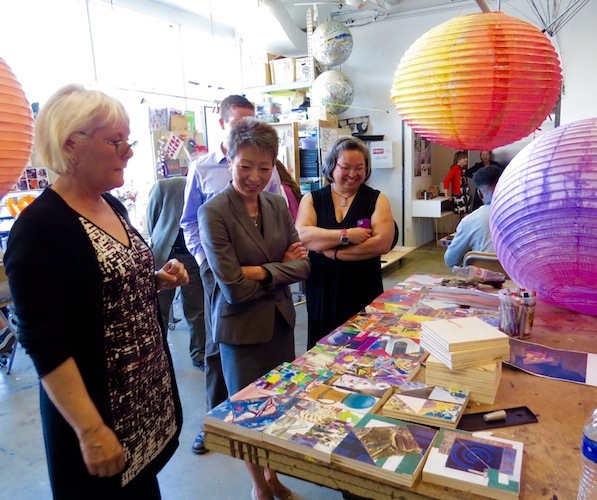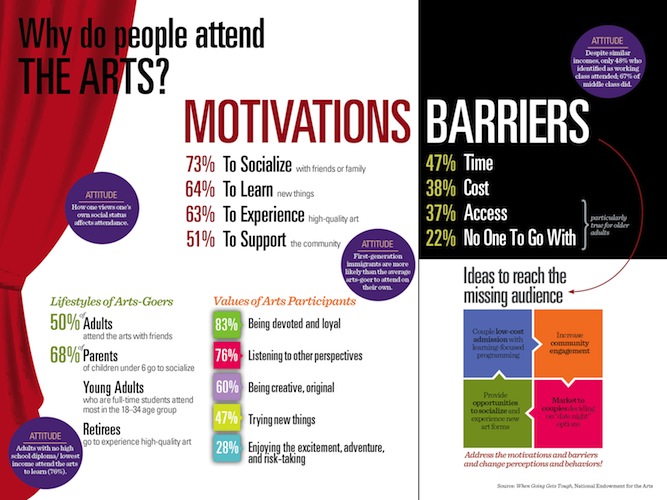Fuse Commentary: Five Minutes With NEA Chairman Jane Chu
God speed Chairman Chu on her mission to make the fine arts less marginalized in a determinedly bottom line culture, obsessed with the pragmatic rather than the imaginative.

l to r: Susan Rodgerson (co-founder and executive director of Artists for Humanity), NEA Chairman Jane Chu, and San San Wong (senior program officer for Arts & Culture for the Barr Foundation). Photo: Kristen Hagan, courtesy of the NEA.
By Bill Marx
National Endowment for the Arts Chairman Jane Chu was in Boston Monday at the invitation of the Barr Foundation, touring the city as part of her year long celebration of the 50th Anniversary of the NEA. The idea was to visit areas “where the arts are a core part of community revitalization efforts” — the places Chu took in included the Upham’s Corner neighborhood in Dorchester, the Fairmount Cultural Corridor, Emerson College, Boston’s Literary Cultural District, and Artists for Humanity. I was given an opportunity to talk to Chu for around five minutes at Emerson College. I came away impressed: she is a personable, smart, and articulate advocate for the arts. God speed her on her mission to make the fine arts less marginalized in a determinedly bottom line culture, obsessed with the pragmatic rather than the imaginative. She is doing some good work already, accumulating some revealing data on why people don’t attend arts events. (See NEA graphic below)
I had my agenda, so when Chu told me that she wanted to spread the word about the power of the arts, a mash-up of different cultures that was “working,” I asked whether there were plans at the NEA to help fund the efforts of those who want to help articulate why the arts are valuable. The dumbing-down and/or shrinking of arts sections in major newspapers and magazines and on broadcast continues apace, to the point that you can no longer tell criticism from publicity. The spread of the language of PR can be scary at times — when I ask my students why they like or don’t like a certain performance or film I often hear more about the flaws in marketing campaigns than I do about the art itself. Chu said that at the moment there are no plans to support this kind of journalistic dialogue, but that she was aware of the need — her predecessor Rocco Landesman had brought the issue up.
For Chu and other arts leaders, community is the tried-and-true buzzword, at times to the point of distraction. I am old enough to remember a time when the arts were touted for their complexity, beauty, and ability to generate critical thinking. Those words and others have been tossed into the trash can of ‘elitism.’ Now the arts are not only income generators but a means to bring different communities together, an admirable if reductive goal.
And what does the community mean today? Is it only another word for marketing? That disappointing prospect came up during ArtsEmerson head David Dower’s rah-rah patter in front of the press and Chairman Chu about the success of the “World on Stage.” As an example of community interaction with audience members, he mentioned how an acclaimed production from South Africa of Strindberg’s Miss Julie — which was very raw and sexual — was seen as a bit “too much” by some viewers. His response to this objection (from how many?) was not a profile in courage: he said the organization needed to come up with the “right balance.” Translation: keep the programming safely PG. The irony is that Miss Julie is one of the best productions ArtsEmerson has brought in to date. Worse, the idea of positioning the theater’s season in the audiences’ sweet spot runs against the notion that the purpose of theater is to provoke and challenge — not just placate and empower. The approach of large regional companies such as Arts Emerson, The Huntington Theatre Company, and the American Repertory Theater appears to be to brand themselves as ‘brave’ and ‘bold’ and ‘edgy’ (labels that our critics dutifully parrot), but that when it comes down to it they are desperately eager to hear from audiences how they can please them better. Ezra Pound said that literature was news that stays news — cranking out happy talk doesn’t qualify.
Another variation on the ideal of community came up in my brief talk with Chairman Chu. I asked her about the expansion of the NEA into supporting digital art and video games. Chu made the reasonable point that increasingly arts creation (and consumption) was taking place online and that it simply couldn’t be ignored. Fair enough… and there are some amazing video games and digital images being made today. (One of the few places where serious criticism is thriving is the evaluation of video games.) But this attempt to cast a wider net at the NEA raises some large questions.

It seems to me that over the next decade two definitions of community will evolve, and at the moment we don’t have the means (via dialogue, criticism, etc) to link them. (Aside from the quixotic efforts of publications such as The Arts Fuse.) The traditional physical gathering at a performance space inevitably conflicts with the new virtual community, which is made up of people who connect to each other via screens and like it that way. Video gamers make up a community of ‘players’ that stretches around the world. What will the fallout of this be, especially given that more and more art is being hatched electronically? And that young people are incredibly comfortable downloading art they and others create so they can look at it (theater, music, movies) at their leisure on their ever more sophisticated devices? And at a cheap price — no parking or restaurant bills. A Netflix subscription service for theater productions is around the corner. Chu talks eloquently about the achievements of the first fifty years of the NEA, and to her credit she is also looking forward to the next 50. Given the enormous changes that technology has already wrought, the transformation will no doubt be revolutionary. If we want to help shape a healthy future for the arts it behooves us to try to dream and think ahead.
Bill Marx is the Editor-in-Chief of The Arts Fuse. For over three decades, he has written about arts and culture for print, broadcast, and online. He has regularly reviewed theater for National Public Radio Station WBUR and The Boston Globe. He created and edited WBUR Online Arts, a cultural webzine that in 2004 won an Online Journalism Award for Specialty Journalism. In 2007 he created The Arts Fuse, an online magazine dedicated to covering arts and culture in Boston and throughout New England.
Tagged: Arts Emerson, Barr Foundation, David Dower, Jane Chu, National Endowment for the Arts, San San Wong

Your concerns about what theater producers are concerned about hit the target as the inane post-performance theater surveys illustrate. There is never a question asking if you came to be excited, or challenged or provoked. They only ask if you came to socialize or have a cathartic experience, as if you knew beforehand what the play would be like.